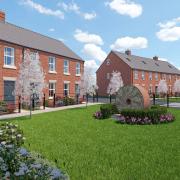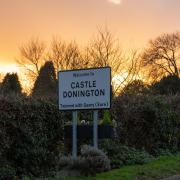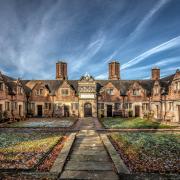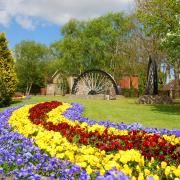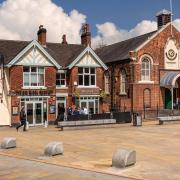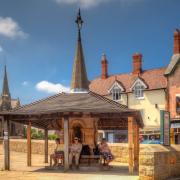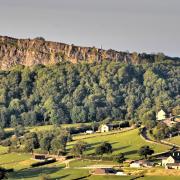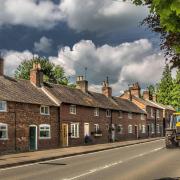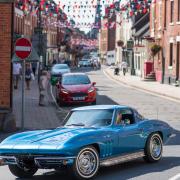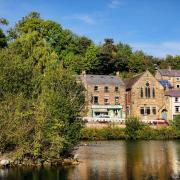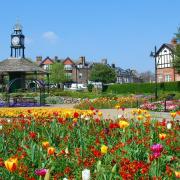On a return visit after 15 years, Ashley Franklin finds that this mid-Derbyshire parish has remained an idyllic little corner of old England.

In 2004, when I last wrote about the mid-Derbyshire parish of Turnditch & Windley, I began by painting a suitably romantic portrait of the place, describing John Bryer's plough 'carving fresh dark tones' in the sloping fields of Turnditch Hall Farm as 'cotton wool cumulus clouds floated high across the miles of blue sky.'
Fifteen years on, I called on John once again to find the view unchanged and the picture I took of him on his tractor framed on the wall. However, above all I noticed the numerous sympathy cards overflowing from window sill to table. John's wife Jean had died the week before and the community had clearly rallied round to offer John comfort. He later told me that Jean's funeral at Turnditch All Saints' Church was brimful of well-wishers, bringing to mind the words of village school headteacher John Bolton that, 'This is a deeply caring community where everyone looks out for each other.'
John also has the close support of his son Charlie who runs the farm and lives next door with his family. It looks as if Charlie's 14-year-old son Zac will become the fifth generation of Bryers to farm the 250-acre mixed dairy, sheep and arable farm. 'The work is never done,' says John, which is why at nearly 84 years old he still mucks in, as he did from the age of ten. 'Did you drive a tractor as a lad?' I enquired, to which John replied: 'Actually, we were still using horses then.'
Turnditch & Windley was then largely a farming community, unlike today with the Bryers' farm one of only five remaining. Although the original name of Windley means 'pasture clearing' and was first recorded in 1297, it wasn't until the 17th century that farms were established as local forests were cleared. Both Turnditch (which means 'winding ditch') and Windley used to be in the midst of Duffield Frith, a royal hunting park where fallow deer roamed alongside wild boars and wolves. The first dwellings in Windley and Turnditch would largely have been for foresters, and All Saints' Church was erected in the 13th century as a chapel-of-ease.

For nearly 175 years it's been very much a chapel-of-ease for the primary school that sits directly opposite. 'We use the church as another classroom,' reveals headteacher John, who tells me that Turnditch C of E is 'an inclusive, caring and compassionate school based on Christian values.'
The school opened in 1846, and must have the most handsome school frontage in Derbyshire with its dovecote tower, John Smith of Derby clock and the original lattice windows. John describes Turnditch Primary as, 'A jewel of a school to work in with superb staff, supportive parents and wonderful children', and where in reading, writing and maths, his pupils are well above the national average. Having joined the school in 2000, John has reached that rewarding stage where he is meeting parents who were once pupils, which shows how rooted families are in this parish. He noted that in All Saints' churchyard many family names on gravestones from centuries past are still found locally.
John speaks proudly of the school 'enriching the lives of the children through close links with the local community.' This is exemplified in an extraordinary way at Turnditch Primary. The school's involvement in the annual Turnditch & Windley Show is arguably the reason why this is probably the biggest and best small village show in the country - even more remarkable as the combined population of the parish is only around 500.
Great credit is also due to retired former headteacher Michael Halls, who ensured that every child took part in the show: out of 15 classes for children, 11 are decided by the school and complement National Curriculum requirements. Michael is now even more involved in the show, having taken over the role of secretary from the late Margaret Beardsley, who was its linchpin for well over 55 years. The beauty of the show, as Michael points out, is that it has 'maintained the traditional village small show atmosphere.' Walking into the marquee with crafts, cakes, chutneys, damsons, dahlia displays, unfeasibly long runner beans and impossibly huge onions, is like entering a portal to the late 1940s when the show began. Refreshingly, entries have increased year-on-year in the last decade, according to chairman Les Blanchon, and attendance is high, too.

'People adore the show because it's such a friendly and fulfilling family occasion,' says committee member Jean Harrison, who has been involved in every show since entering classes as a child 70 years ago.
The show, which is now held in fields alongside the Wirksworth Road, grew from a WI garden fête at Flower Lilies, the home of Lady Inglefield, wife of Admiral Sir Frederick Samuel Inglefield and heiress of the Derbyshire banker John Gilbert Crompton. One of their sons, Sir Gilbert Samuel Inglefield, became Lord Mayor of London. As a great benefactor to Turnditch & Windley, Lady Inglefield became known as the Lady of the Manor, and her name lives on through the Crompton Inglefield Village Hall, a hive of activity for the school, playgroup, art group, dance class, karate club and WI.
Next to the village hall is the 150-year-old Tiger Inn. In 2004 it was being run by Richard Strzyzewski and his partner Jacqui, who were then working hard to 'create an old-fashioned pub spirit.' That spirit appears to have been bottled by Richard's son Marc and his wife Rosie, who took over in 2011. Marc, who had a career as a restaurant manager with Little Chef, has no regrets. 'It's ironic,' muses Marc, 'I was a mere cook in my Little Chef days, yet this pub has turned me into a chef.' Well placed along the A517 Belper to Ashbourne road, its menu includes intriguing dishes such as Brazilian Shrimp Stew and Beetroot, Brie & Cheddar Tart. On Thursdays, Pie Night invariably sees all 54 indoor seats and, on warm nights, the 40-odd outside, filled. The list of pies, with either puff or short crust pastry, has grown to 150 - a world record, believes Marc. I noted pies ranging from Lamb and Mixed Berry to Three Fish and Leek and even, in honour of Derby County's former manager, Frank Lamb'pard pie. Marc is aiming for 200 so I suggested creating one for the latest Rams boss, perhaps Cocu'nut Curry pie!
If you eat outside, there is a pleasant view of the countryside stretching for miles. Inside, you can enjoy a drink in the bar area and even play darts or dominoes. Better still, the Tiger is undergoing a further refurbishment. 'Running a pub is a big commitment,' says Marc, 'but it doesn't feel like work. It's more a way of life and so many customers have become friends. We love Turnditch, too - it's a wonderful place to bring up our two children.'

Sadly, the Cross Keys further down the hill closed in 2017, along with the butcher's shop, and its future is uncertain. A recent application to build four houses was turned down by Amber Valley Borough Council, who also awarded the Cross Keys building Undesignated Heritage Asset status as Heritage England believe it to be, at its core, a 16th century coaching inn. Resident Lindsay Burton, who runs the website Turnditch Life, suggests the villagers could take inspiration from Holbrook and re-open the Cross Keys as a community pub. Lindsay was inspired to start the website when she heard about the planning application: 'It made me realise that our own history is rapidly being lost to the insatiable need for new housing.' This has led to a local history page and a general realisation that a village website is a valuable asset, especially in a parish like Turnditch & Windley, both ribbon settlements without a centre. 'This is a lovely place to live with the amenities of Belper close by and the countryside on our doorstep,' observes Lindsay, 'so I'm delighted to see the website becoming a community-led project as it will help bind the parish and boost the good community spirit we already have.'
Lindsay runs her own cottage industry, Lindsay's Still Room, which harks back to medieval times when wine and beer were brewed using fruit, flowers and herbs grown in the kitchen garden or from the countryside. Currently, Lindsay is creating cocktail syrups to create 'garden to glass' concoctions. Fortunately, she lives in quite a fertile place.
When Rosalind Bliss, daughter of acclaimed artist Douglas Percy Bliss, came to live at Hillside Cottage in Windley at the end of World War II, she found an orchard of more than 100 fruit trees at the back of her house and garden flowers growing to enormous sizes. As Rosalind told me, 'I make a point of buying tall plants so that they can compete with what's already here.'
It was a delight to behold Rosalind's luxuriant garden and, inside her house, paintings by both father and daughter. Inside Rosalind's studio, I saw everything from small engravings to large folding mural screens, and paintings which confirmed what I had read about her work, namely that it is 'characterised by a rhapsodic atmosphere in which trees and skies are full of movement and drama.' I could also see how her father instilled in Rosalind a love of trees - 'their shapes and intricacies' - and observe that same 'energy' which Rosalind so admires about her father's work.
Although Douglas went on to become Principal of Glasgow College of Art until 1964, he kept the family home, not least because of the inspiring landscape. I pointed admiringly at his pastoral painting of cows resting in a field. 'You can walk through that picture,' observed Rosalind. 'He loved this countryside and he especially loved trees, though it was much more verdant here when he was painting.'
However, there is still a lot of greenery hereabouts, one of the reasons Stephen Milward and partner Sarah moved here in 2011. Stephen more than confirms his credentials as an estate agent - he runs A&S in Belper - in describing how he settled on a move to Windley: 'As soon as we saw the signpost to "Windley Only" we sensed a tranquil, rural, away-from-it-all hamlet. Our home is ideal, the neighbours are warm and friendly, we love the food, drink and conviviality of the Tiger and all around there are picturesque walks over open fields offering stunning views and abundant wildlife. It's idyllic.'
If you want to experience the same, the Old Cheese Factory, which was just that, is now a luxury five-star holiday let in the grounds of Windley Hall, and recently featured in the Sunday Times '100 Cool Cottages' list. I experienced a breath-taking view when I was given off-limits access by Charlie Bryer to the hilltop opposite Turnditch Hall Farm. Charlie promised me - and delivered - the perfect panorama for my camera: a view of the Ecclesbourne Valley in its full glory.
With a smile across his friendly, weathered face, so redolent of a farmer's life well-lived, John spoke of his love for this landscape and his place in it. 'You couldn't live in a better part of the world. Although I'm in my 80s, I still rise at 5.30 every morning and cherish the peace and quiet, broken only by birdsong. OK, it's not so romantic in a February frost where the wind can blow you up the chimney, especially here where it's a degree or two colder than the valley below. However, I just love being a guardian of the soil where the work is different every day. It's wonderful just to sit up on the tractor, take in the views and see the fields change with the seasons. Also, this area has remained relatively unspoilt, and so has the light - it's beautifully clear and clean. This is the place to live if you want to see the stars.'




